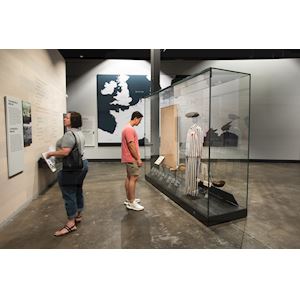
112 - Bearing Witness - Artifacts from Camps and Killing Centers
NARRATOR The garment in the case is not a costume. It is the authentic uniform worn by survivor Siegi Izakson in Buchenwald. He was down to 87 pounds when he wore it, at the last of seven camps he endured. "The first thing that happened to us is that we lost our names…No longer were we individuals. Now we became numbers. Each one of us received a number, and we were to remember this number, and eventually we sewed it on our jackets…" "Our experiences were hard work, brutality, subhuman living conditions, unsanitary you might say quarters or whatever it is, no medical help, and of course, the most important thing to us was lack of food…" NARRATOR Even though Mr. Isakson had his uniform professionally cleaned and preserved after his liberation, when he wore it at Buchenwald, it was not laundered; it was filthy, rank, and miserable. It served as his coat during the freezing winter. Dignity and comfort had no place in the killing centers. Ann Blum: "We didn't have much clothes, just a little uniform, and it was always, who knows how much below zero, I don't even know, and no food and you worked 12 hours without food…” NARRATOR Bernard Gerszon: "We were, excuse me, deloused, putting those sharp chemicals underneath and on your head and your hair. You stink a mile away. You couldn't breathe… […] you were given the striped uniform and you were right away assigned a barrack …and you were given a number. I remember my number exactly, 95112." NARRATOR Other artifacts from the killing centers—the Zyklon B canister; the crematorium brick from Auschwitz; bits of bowls, spoons, broken eyeglasses, tattered garments—all serve as testimony to the event. Their value to history is greater than jewels or precious metals because they are part of the story of the Shoah, the ancient Hebrew term for calamity or utter destruction—what we refer to as the Holocaust.


Holocaust Museum Houston
Holocaust Museum Houston is dedicated to educating people about the Holocaust, remembering the 6 million Jews and other innocent victims and honoring the survivors’ legacy. Using the lessons of the Holocaust and other genocides, we teach the dangers of hatred, prejudice, and apathy.
- 5401 Caroline
- Houston United States
- 713-942-8000
- www.hmh.org
